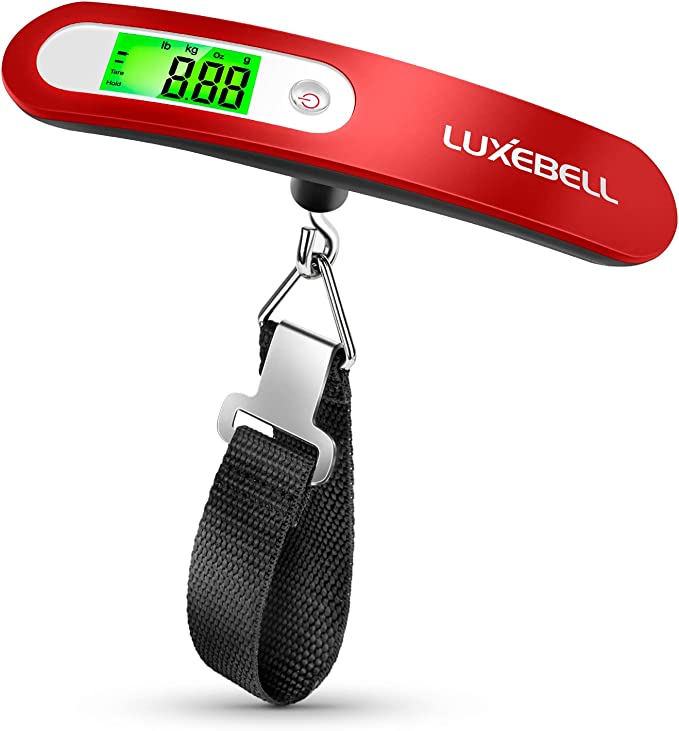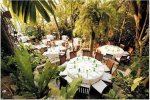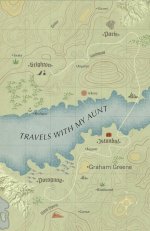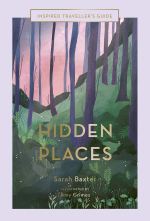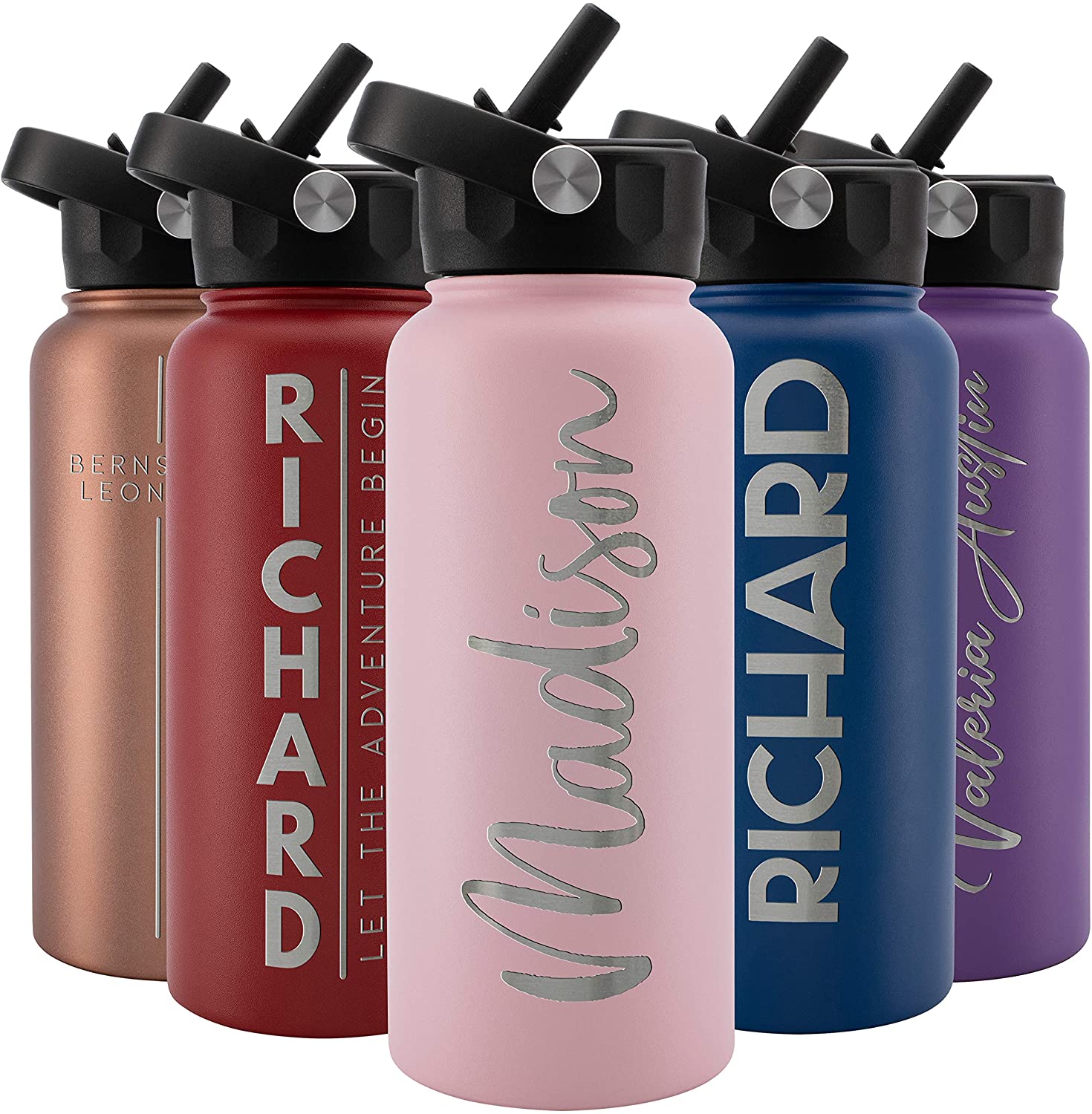Hitchhiking in Albania
Follow Jayne Dear's adventures while hitchhiking in Albania!
After four months of backpacking around the Balkans, travelling by ancient trams, battered buses and antiquated trains, I arrived in Albania. Here the transport system made the rest of the Balkans look state of the art. This was when I bumped into Betul, a 33-year-old digital nomad from Turkey. Over late morning coffee, she suggested we go to the Blue Eye, a famous gushing spring.
“I don’t think that’s possible, Betul,” I said. It would take all day just to get there by bus! Take it from me!”
“We’ll hitchhike,” she said.
Hitchhiking in Albania
The reasons why I’ve never hitchhiked before are complex and varied. My Mum always gave me the impression I’d be raped and murdered, and it had definitely dropped out of fashion around the time I entered adulthood in Western Europe.
But 30 minutes after meeting Betul, I was standing beside the road with my thumb out. I had my Mum’s words ringing in my ears and I could only imagine my adult children’s wails of horror and embarrassment, but Betul was a pro and it wasn’t more than 10 minutes before we were on our way.
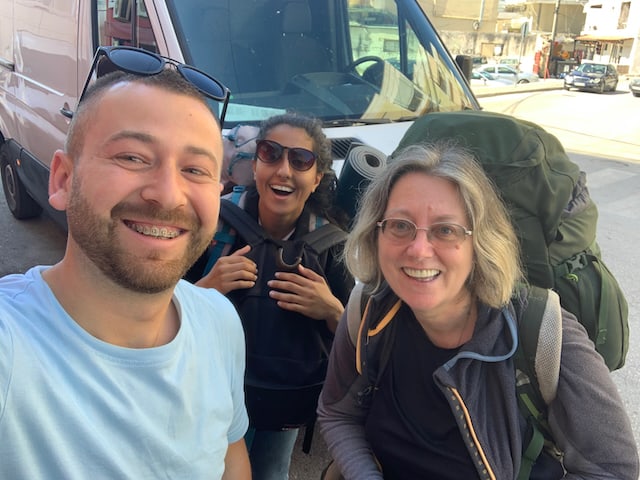 The start of our trip!
The start of our trip!We were dropped at the dirt road leading down to the Blue Eye, and here we got a lift from a young German couple in a 4x4 hire car. When Betul asked if we could have a lift back too, they readily agreed.
I offered to buy everyone a drink, an offer they took me up on when we’d all marvelled at the amazing Blue Eye. Betul, however, wasn’t happy and refused to let me buy her a drink. I got the distinct impression she thought I’d broken one of the rules on the Hitch Hikers’ Code of Conduct!
Six lifts later in various forms of transport that were in various states of repair, we were back at base in picture-perfect Ksamil, which is in the far south and a cross between a Greek island and the Caribbean. Here we relived one of the most memorable days I’d had on this planet in my 58 years. Betul was a delightfully engaging character, and we enjoyed juicy cherries given to us by one of our drivers, and a carafe of red wine.
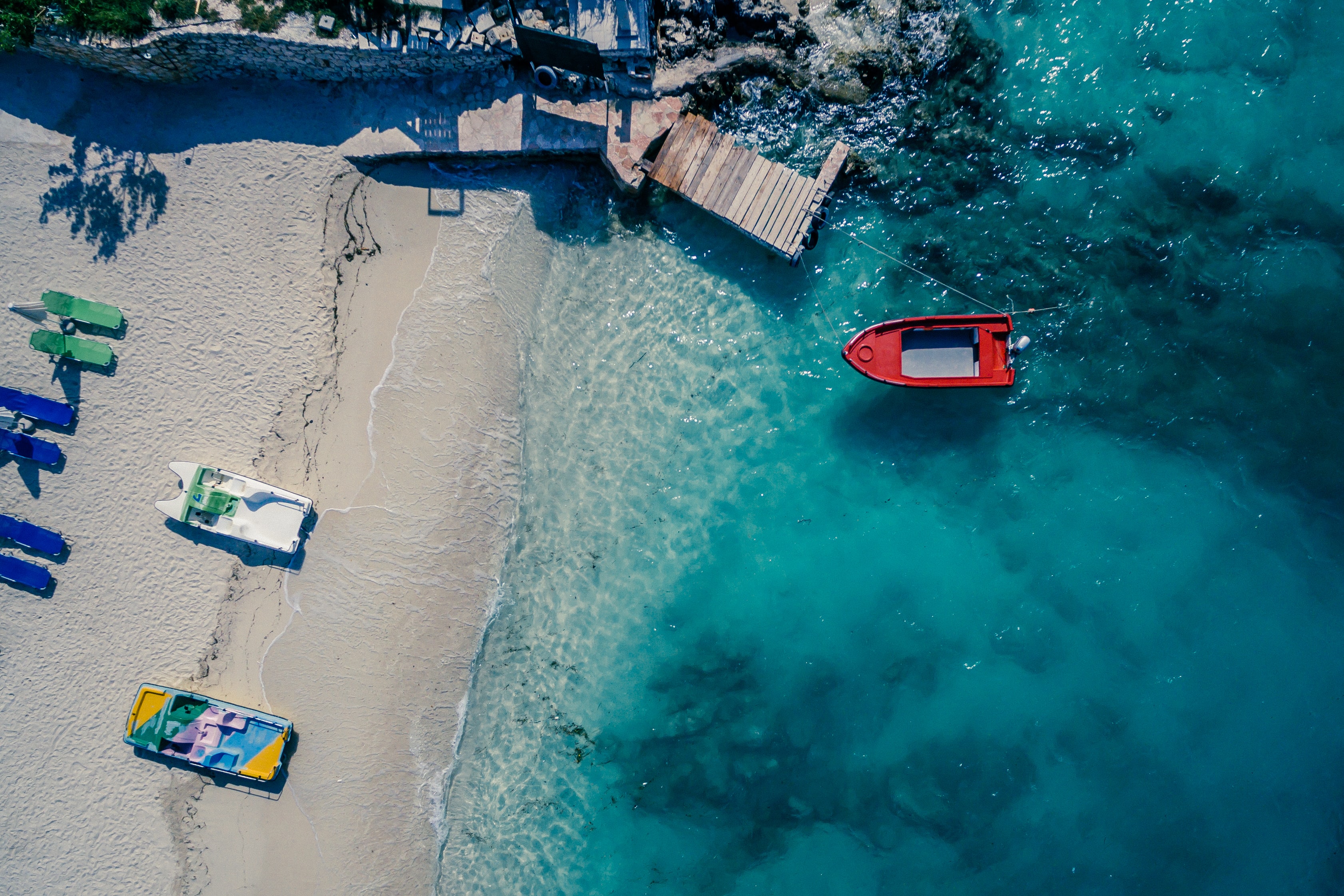 Ksamil, Albania, from above.
Ksamil, Albania, from above.A few days later, we headed off on a longer trip to Gjirokaster, which has UNESCO World Heritage status owing to its historic Ottoman old town. We walked a few minutes to the main road and just past the bus stop to give ourselves more of a chance of finding a lift.
A few drivers that passed pointed down with their forefinger. This meant, ‘I’m only going locally’. I was quickly learning the sign language of hitchhiking. Within five minutes, a man in his sixties pulled over. We used Google maps to determine that he was going to Sarandë, a large and pleasant coastal town further up the coast on the way to Gjirokaster.
We were being watched by an elderly lady at the bus stop, and as we were getting into the car she hopped in too! Betul called her a cheeky beggar but I couldn’t help but admire her enterprise.
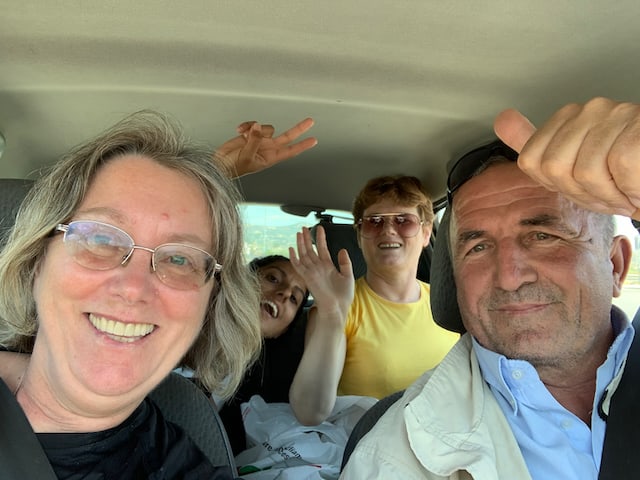 On the way.
On the way.Hitchhiking in Albania
When we reached Sarandë, our driver dropped us in a lay-by with a fruit stall. Never wishing to miss an opportunity, Betul went to speak to a man in a car waiting for his wife, who was at the fruit stall, to see if he was going in our direction.
Unfortunately, he wasn’t, but he jumped out of the car and took charge of getting us a lift. This proved to be counter-productive! I know he was trying to help, but everyone passing probably thought he was part of the package and just drove on by. I was willing his wife to finish buying her artichokes and, lo and behold, as soon as he departed, we were picked up by a white-van man with a very large crack in the windscreen.
I assume they may not have an annual motor vehicle test in Albania or, if they do, they just bung them a few Lek to get a certificate. I know for a fact that this is how the driving test works. When I expressed surprise that everyone in Albania seemed to pass their driving test the first time (it took me four goes!), an Albanian said, “Yer, you just slip the instructor some cash.”
When the white-van man dropped us at a petrol station en route to Gjirokaster, we were picked up by a suave man in a fancy car. He was one of the Albanian jet-set; young men with rich parents who had bought them a hotel or travel business to run.
As we wound our way up over a dramatic mountain pass, he told us that he was on his way to an English lesson near the Greek border. “I’m an English teacher!” I told him. His eyes lit up and we spent the next 30 minutes warming up for his lesson before he went out of his way to find us a safe place to hitchhike further north.
Our next lift was dodgy!
Not in a sexual harassment sort of way, but in a dangerous driving sort of way! The two young men didn’t speak any English. The driver, if that is the correct term, spent more time texting and organising his playlist than he did looking at the road. Loud Albanian rock music boomed out disco-style, and Betul recorded the scene for posterity and sent it to me.
I had visions of it being presented in the coroner’s court to support a verdict of ‘Death by Dangerous Driving’, but luckily it was only 10 minutes before they dropped us off at Gjirokaster.
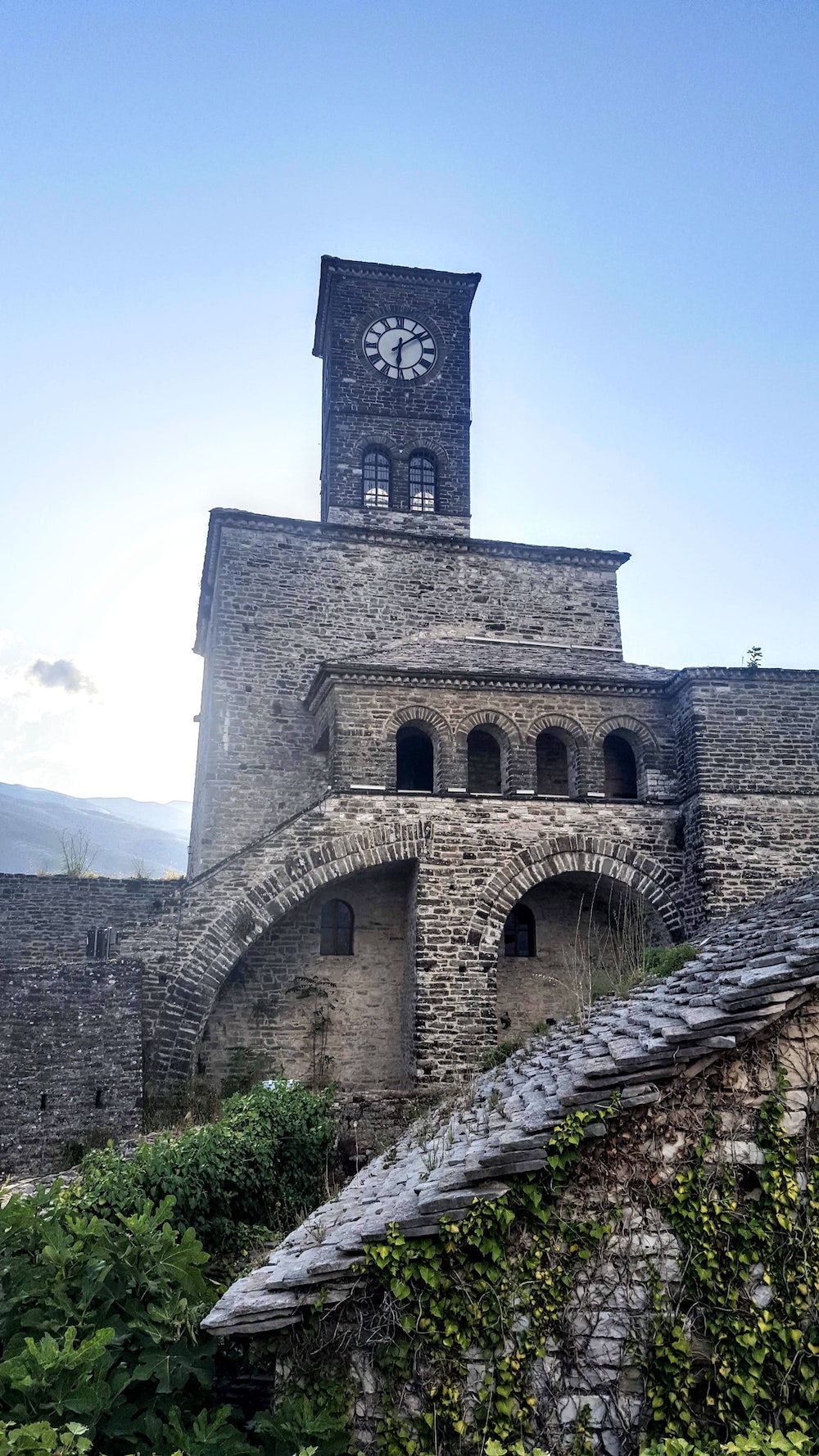 The Clock Tower at Gjirokaster
The Clock Tower at GjirokasterOn the journey back, we had a few issues. I was pleased to see that, like me, Betul had a keen antenna for potentially dangerous situations. She is not a woman to be messed with. We made a good team in a Cagney and Lacey sort of way!
A car with three men in it drew up. One was elderly, but the other two would have been more than a match for Betul and I. They were going to Sarandë. Great! We got in. “How much do you want to pay?” asked the driver.
“No!” said Betul. “Hitchhiking! No money!” The driver didn’t understand and got some notes out to show us. “Right,” said Betul, sounding exasperated. “We’re getting out!”
I followed Betul out of the car and so did the driver. “Sorry!” he said, “We go!”
“No!” said Betul, firmly. “Go away and leave us alone!” I was glad we were at a busy junction because the man refused to give up.
Hitchhiking in Albania
I sighed a deep sigh of relief when we were given a lift by an elderly couple who were Albanian gypsies. I admired her colourful headscarf to take my mind off the recent confrontation, but Betul kept looking back and reported that the men were following us.
Unfortunately, the Albanian gypsy couple were only going a few kilometres. As we got out of their car, thanking them and waving them off, the three men drew up in their car. The driver got out. “We go!” he said, looking hopeful.
Something about his face suggested he just wanted to make a quick buck and that he wasn’t about to leave us tied, bound and gagged after doing unthinkable things to us at the top of the mountain pass. After all, the average wage in Albania is 300 Euros per month, and he probably had a family to feed.
In the U.K., a slap-up meal for four would cost close to that in a posh restaurant. In addition, I later found out that Albanians often get lifts from strangers and give money to cover petrol, so what he was doing was nothing unusual.
He hadn’t, however, bargained on Betul who by now had turned into a vicious Rottweiler.
“If you don’t get back in your car and drive off now, I’m going to report you to the police" she said, fixing him with a steely glare and pointing at the police who had very conveniently set up shop with a speed gun only 100 metres further up the road. This did the trick. He got back in his car and drove off.
Having had our fair share of drama for one day, it was good to have a nice, cozy, married couple take us back to Sarandë on the way to our base in Ksamil.
From Sarandë, our lift back to Ksamil involved a heated rant from our driver in pidgin English. Betul sat in the back with David, his 10-year-old son, and I got the full force of his anger in the front.
He had a long list of pet hates which included the Greeks, the Slavs, the Orthodox religion, the Russians, the French, the British and Tony Blair. Now, many Brits hate the former Prime Minister, but I never got to the bottom of why he was so unpopular with this Albanian man. Did he blame him for the Iraq war too?
When Corfu came into view as we drove over the brow of a hill, he became even more agitated.
“It should be Albanian,” he said, “not Greek! And I blame the British for that.”
Now, for all of you Tony Blair haters, I can safely say that it had nothing to do with Tony, as it was clearly something related to the breakdown of the Ottoman Empire about 30 years before he was even born.
Poor little David had to help his dad translate some of his rant into English. It never ceased to amaze me how well young Albanian children spoke English. It later became clear that their cartoons are in English as well as Russian and Turkish, so they are well on their way to being multilingual before they are out of nappies. I felt rather jealous as I’ve been trying to learn other languages without much success for years!
Hitchhiking in Albania
Hitchhiking in Albania from our base in Ksamil was the prelude to a whole new adventure. Over the next few weeks we joined up with Turkish friends of Betul, and criss-crossed Albania reaching places that no self-respecting bus would venture.
Albania is stunningly beautiful. It has mountains, lakes and an amazing coastline. Most people would struggle to place it on a map, because it remained closed off to the world until the nineties when the communist regime collapsed.
I lost count of how many concrete bunkers we passed, installed by the famous communist dictator, Enver Hoxha, who was neurotic about being attacked and built them every few kilometres. They were never needed and have now become a weird icon of Albania.
In addition, it is at the crossroads of a smorgasbord of empires from the Greeks and Romans to the Byzantines and the Ottomans. Take your pick! Today, the scars of a dark period of their history run deep. Hitchhiking was the perfect way to expose the wounds of this tragedy, made more poignant by the warmth and generosity of the people we met.
We were frequently invited for coffee and snacks, and when we tried to insist on paying we were waved away.
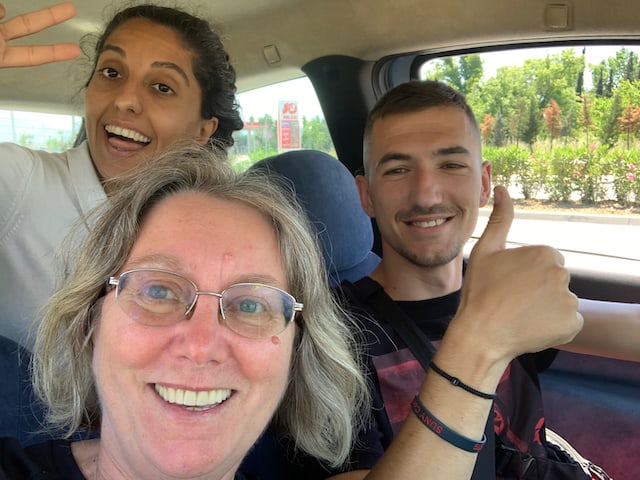
A story of mass migration, particularly in the late nineties during what is known as the civil war, soon emerged. Many spoke good English and could share with me their experiences of life in the east end of London, often doing several jobs and sending money back to family in Albania.
I heard tales of legal and illegal migration. Boats on the way to Italy had been intercepted by border patrols and returned to Albania. I was assured that it was still possible to get into the U.K. in the back of a lorry if you knew the right people, but it was very expensive.
Eri picked us up on our way north to Shkodër, an interesting town in a stunning location on the shores of the lake of the same name. He described how he’d been imprisoned in the Netherlands for being an illegal immigrant and then deported.
He kept me entertained on a long journey with tales of cigarette smuggling. “I was young and stupid,” he told me. “I didn’t realise the risks.” He visibly shuddered as he mentioned the long prison sentence he would have faced if he’d been caught. “I was paid £5,000 to take a boat from a beach in England to Ireland. Cartons of cigarettes were loaded onto the boat from the back of a lorry. We took the boat to Ireland, unloaded, and returned.”
“Did you ever meet the Mr Big?” I asked.
“No,” he replied, “I just got a bag of cash which I spent on beer and clothes in Piccadilly Circus.”
He was nineteen at the time, and 30 years later he considered himself a reformed man. He proudly told me about his wife and children and how they are self-sufficient.
“We’ve got a goat that provides milk, and we slaughter its offspring for meat. We grow all our own fruit and vegetables.” He showed me photos of his roses, but it was with a tone of sadness that he recounted how he still has to work abroad to support his family back in Albania.
Eri’s story of a double life was more common than not. I frequently found myself conversing in German and my basic Italian because the driver had spent significant time there.
Eri may have given up his life of crime, but I heard other shady stories about the criminal activities of the Albanian mafia. I was told they all came from the Albanian town of Kukës. In fact, if a report on British radio was anything to go by, most of this town’s mafia were in a British jail, having been banged up for drug trafficking, gun-running and people smuggling!
The few women that gave us lifts stood out. Eva was on her way to get a boat back to Italy where she was a cleaner and waitress. Irena was a pastry chef who took us to her bakery to show it off and selected some delicious cakes for us to try.
I was constantly amazed at how the drivers would put themselves out. They’d stop and hastily shove mops, clothes, fresh produce and even family members into the back of the car to make room for us. In addition, they would often go out of their way to drop us where we were going, or to find us the best place to get our next lift.
Hitchhiking in Albania
On one day, Betul and I hitchhiked the length of the country from south to north. Now, Albania turned out to be smaller than I had imagined, but this was still a marathon that involved a record 13 lifts. It was both exhilarating and exhausting at the same time.
It was on this mammoth trip that I realised that Betul had a serious hitchhiking disability. As we wound our way over the steep and winding Llogara Pass, I was admiring the spectacular views from the front seat until I became aware that Betul was curled up on the back seat going green at the gills. Fatos, our delightful young driver, was really worried about her and stopped at a viewpoint kiosk to buy her water and snacks. It was very touching but Betul just wanted to be left alone to suffer in silence.
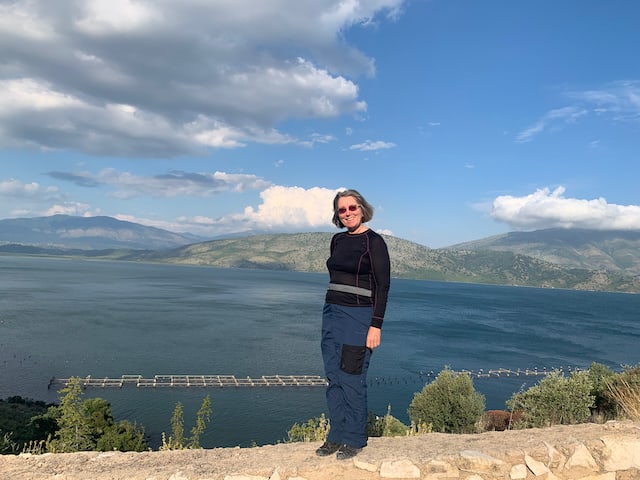
It was often hard to get a lift in a town or city centre as people usually weren’t going far. Betul did a great line in dramatic gestures which included waving, blowing kisses, begging and even jumping into the middle of the road on occasion to make it hard for them not to stop. I, on the other hand, employed the hitchhiking fairy, a cousin of the parking fairy who I use when I can’t get a parking spot near Christmas. Works every time! Take it from me! Now, I can’t be sure on this occasion whether it was Betul’s dramatics or my fairy, but we soon had a plum lift out of town to the perfect spot for getting a long distance lift north!
One lift that stood out on our journey north was Tony, who was heading for Tirana International Airport. When a car stopped we always began with a smile, a përshëndetje (which means hello in Albanian) and “Do you speak English?”. It made life easier if they did speak English, but if they didn’t then we always had our good friends, Google maps and Google translate to fall back on!
“Yes!” replied Tony, confidently, “I’m an air traffic controller.”
“Well thank goodness for that,” I joked. “There would be a few crashes if you didn’t speak English!” As air travel is my public transport of choice, I jumped at the chance to get an inside view of this little-known but crucial profession.
I’ve chatted to aircrew and ground staff on many occasions, but I only ever remember talking to one of the guys in the tower, and that was when I was on holiday at the age of 15 so it’s a few years since I got an update! I say 'guys' because it remains one of those professions that is almost exclusively male. Mind you, when you think about the skills needed, such as attention to detail and intense concentration, that’s rather surprising. I’m just saying, gentlemen!
Tony and I chatted about all the high-profile incidents that must have been a nightmare for the air traffic controllers on duty. There was the Air Malaysian flight that took off, went in the wrong direction and was never seen again; the German Wings pilot who committed suicide by flying the plane into a mountainside, taking 149 passengers and crew to their deaths; the Air France flight that crashed over the Atlantic; the Air Malaysian flight (you have to feel sorry for this airline) that was shot down by rebels over Ukraine.
The list goes on! Most topical was the Ryan Air flight diverted to Minsk only a week earlier so the authorities could nab a dissident who thought he was flying from Greece to Lithuania, but soon found himself languishing in a Belarus jail!
I asked Tony the million-dollar question, “What would you do if a plane was hijacked on your watch?”
“We can call on NATO bases in Italy and Greece,” he told me, “but I can’t say too much about this!”
“Oh, come on, Tony! Spill the beans!” I thought, “Do I look like a Russian spy?” He was, however, tight lipped as he’d obviously signed the Official Secrets Act, and no one would put it past the Russians not to have spies hitchhiking in Albania!
Luckily, most days for Tony are uneventful. He said most of his work involved planes flying over Albania from America or Western Europe and going to Greece, Israel and Singapore or vice versa. He did, however, say that the closure of Syrian air space had made his job more difficult.
When Tony dropped us off, I gave him my flight details for my return flight to London in a few weeks, and asked him to ensure my plane got priority. He assured me Wizz Air Flight W6 2641 to London Luton would get the V.I.P. treatment. True to his word we took off on the dot with me waving at Tony in the tower from seat 29a!
As the hours ticked by and it got dark, I had to grit my teeth to keep going. Betul flagged down a young couple from Kosovo. “Are you going to kidnap us?” the driver asked. This was the prologue to him entertaining us with non-stop jokes and gags.
As Kosovars, they speak Albanian and pretty much feel like the same nationality. The Kosovo War in the late nineties led to much loss of life. The young couple had tales to tell of family members who had lost their lives during the conflict, and of emigration abroad, stories that we heard from other Kosovo Albanians we met.
When Betul and I headed south again it was with fellow female hitchhiker Emel, who was Turkish. Driver Giovanni was going all the way to Dhërmi, a coastal town with an attractive old town above where the locals speak a variant of Ancient Greek. Huge mountains sweep dramatically down to the sea. We had decided to stay in Dhërmi for five nights, so it was a useful lift.
Giovanni explained that his real name was Xhevahir, but that Albanians often change their name in order to fit in abroad. He’d worked all over Europe as a delivery driver and mechanic. He had an Italian passport but hated the European Union.
It got very tense when he suddenly said, “The Turks are racist!” Now in view of the fact that there were two Turks in the back seat, this was far from diplomatic. He reeled off a long list of other countries that were racist, including the Belgians, the French and the Dutch. “What about the British?” I asked, fully expecting him to add me and my fellow countrymen and women to the list, but no.
“The British aren’t racist!” he replied. His English wasn’t great, so I suspect there was something lost in translation, giving him the benefit of the doubt. However, Betul was seething in the back seat. He was lucky the she was trying to control her car sickness, otherwise I think she would have reached over and strangled him!
Next, he moved on to the Moroccans. He’d never been to Morocco, and only met Moroccans abroad, but it was enough to condemn a whole nation. Now Betul became very angry. “I’ve got many Moroccan friends, and they’re not racist!” she told him, with considerable venom in her voice.
“Change the subject!” hissed Emel from the back seat, aware that Betul was about to commit murder or, at the very least, we would be dumped beside the road on a dangerous mountain pass, which would not be a great place to hitchhike out of.
“Do you know any good restaurants in Dhërmi?” I asked, which proved to be far less controversial.
Once in Dhërmi, Emel plonked herself on the beach and refused to move all day, until she joined us each evening for dinner at a pleasant seafront restaurant. Betul and I, however, did a few trips along the coast that would have been nearly impossible by bus.
One day we went to trendy but very remote Gjipe Beach. It was like something out of Leonardo Di Caprio’s film ‘The Beach’. It was full of beautiful people. Everyone but me was young, tall, slim, bikini-clad and model-like! We left them all on the beach and went walking through a spectacular gorge of the same name.
After about an hour of walking, it narrowed, and we had to pull ourselves up ropes in order to scale rocks the size of a bungalow. Just as we got to this point, having not seen anyone else, two young Ukrainian men caught us up. I told them to go first, not wanting to hold them up, but they took one look at the challenge and turned back! Say no more!
Our second trip was further south, to Livadi Beach. We got a lift with an elderly man in his seventies who thought he was a Formula One driver. He drove at 90mph and took every bend, and there were many, on the wrong side of the road.
As I clung to the side of the car, praying I’d get out alive, I reasoned that he’d lived to a grand old age without dying in a fatal crash, so I would hopefully survive. And, I did, albeit with higher blood pressure and a few more grey hairs. When he dropped us off above the beach, Betul fell out of the back seat looking as if she was about to vomit, and groaned loudly, clearly having given up the will to live.
Our lift down to the beach was with two young men who were looking for work at the bars and restaurants. They promised to take us back afterwards, and the one that came to the beach to collect us steered me into the front seat so he could sit in the back with Betul. Before long he was asking Betul if she had a boyfriend, and whether they could stay at our place. Betul rapidly turned Emel into a man and said there wouldn’t be space. We got them to drop us off well away from our accommodation!
Hitchhiking in Albania
After Dhërmi, I had to say a sad goodbye to Betul, who had been my hitchhiking guru and soul mate for three weeks. She had made me feel 30 years younger, and been fantastic company. I had every faith we would meet again, thumbs out beside a road somewhere, in the future as she faded from view in the back window of the lift that Emel and I took south to spectacular Përmet.
I now had the confidence to hitchhike alone. When Emel also returned home, I was beside the road hitchhiking as if it were second nature. Long gone was the “What the hell am I doing?” feeling, and I joked with my husband, who considers going into a charity shop in an English market town risk-taking, that we could hitchhike on our planned trip along the Silk Road!
On my first long solo journey to Berat, a beautiful UNESCO world heritage Ottoman town, I was picked up by Uron. He was typical of an Albanian who lives abroad. I had to admire him. He had been an officer in the Albanian army and then used his army skills to become a bodyguard. This involved him working in some pretty dodgy places around the world. Then he moved to Austria, where he built up a business doing facility management and car valeting.
He was now on one of his annual trips back to Albania, and it was clear that he brought an air of arrogance with him. His flashy German car was tank-like. I don’t know the first thing about cars nor care about them, to be quite frank. As long as they have four wheels and an engine, and get you from A to B, that’s good enough for me.
However, it was clear that Uron (who was, after all, doing me a huge favour) was very proud of his car, so I faked interest!
“Take a photo,” he said, as he pointed to the dashboard which looked like the bridge of the Starship Enterprise. I uttered lots of ‘oh wow’s and ‘that’s amazing's’! The car had “I’m much richer than you, fellow Albanians” written all over it! It was very common to see cars with foreign plates, bought with money earned abroad. I even saw two Hummers with Albanian plates. They certainly didn’t buy those with a salary of 300 Euros a month!
In addition, Uron was building a house for his mother in the family village. This was another badge of honour for an Albanian Abroad. We stopped at the stone mason's, and although I couldn’t understand the Albanian language conversation, I could understand the swagger of Uron’s tone and body language.
Let’s face it, in Austria he’s probably just an ordinary man on the street but when he’s in Albania he’s ‘The Big Man’ and ‘Lord of the Manor’. Uron said he much preferred living in Austria and was very negative about Albania. Knowing both countries reasonably well, I felt this was rather disingenuous. Okay, Austria is a richer country but money isn’t everything and I bet they don’t pick up hitchhikers and treat them to drinks and a meal out!
Hitchhiking in Albania
While hitchhiking in Albania, my final lift to Tirana proved to be one of my most memorable. I was picked up by a family of four who turned out to be a metaphor for progress made in Albania over a generation.
The small car was being driven by 24-year-old Fatjon, who was an area manager for KFC. His younger sister, Desada was a 22-year-old languages graduate who spoke five languages. They both spoke fluent English and were well travelled. Desada also worked in management for KFC and her brother was her boss, but this was clearly not an issue.
Their parents were my age and, whilst they gave me lots of warm smiles, they spoke no English. Neither of them had a driving licence and as they had never worked abroad, they had never travelled. They were very typical of their generation in Albania.
It made me reflect on how different my life would have been if I had been born in Albania rather than Western Europe. We stopped at a famous restaurant that only served byrek, the famous Albanian dish made of filo pastry and filled with spinach and cheese, and dhallë, a salty yogurt drink. They, of course, refused to let me pay the bill. As if this wasn’t enough, they gave me a tour of Tirana, bought me ice cream at the best ice cream parlour in town, and dropped me right at the door of my accommodation!
The Albanians I met were keen for me to promote their country to the outside world, fearing for its reputation. This I am more than happy to do; keen to shout from the rooftops about the warm, wonderful, funny and generous Albanians! Thank you, Albania and in the words of Arnie, “I’ll be back!”
- Story and photos by Jayne Dear
Author Bio
Jayne is from the U.K. and has been travelling the world since she was eight years old and went on one of the first package holidays in 1970 to Majorca with her family. As a student she did what everyone did in the eighties and inter-railed round Europe. She also spent two wonderful summers as a camp counsellor in Vermont.
As a teacher for 35 years she taught English for the British Council for many years on English Language Summer Camps in Eastern Europe. In addition, she took students on trips around the world.
In 2005, Jayne moved with her husband and three small children to a small town in the Australian bush where she did a teacher exchange for a year and from where they explored the rest of the country.
Jayne and her family enjoyed many wonderful house exchanges and met people from around the world through Women Welcome Women World Wide (5W).
Jayne loves back packing, couch surfing, hosteling and hitch hiking. When Jayne waved her last child off to university, she decided to finish work and do more adventurous travel through longer trips. So far, this has included South America, Turkey and the Balkans despite Covid 19!
She enjoys writing a blog about her travels; you can find the blog HERE.
In addition, she has written books about her travels - click on the book titles for further details:
Return from Hitchhiking in Albania to Adventuress Travel Magazine


